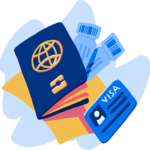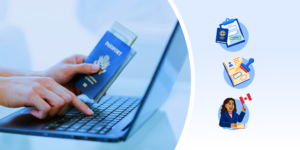To have the opportunity to come to Canada is very exciting. The country is a wonderful destination that welcomes individuals from all countries of the world. If your plan is to pursue higher education in Canada, your first step is to apply to academic institutions, and then, when accepted, for a study permit. We’ll also dive into other major visa types, for reference.
In our video below, and the blog that follows, Hari Ghai, ApplyBoard’s Regulated Canadian Immigration Consultant (RCIC), provides information on the different types of visas available. This can help you determine what type of visa best suits your needs. For official immigration information and support, please refer to the Canadian Government’s website, or contact a licensed immigration professional.

Temporary routes
If you intend to come to Canada for a short time as a student, you can apply for a Temporary Resident Visa (TRV). If you are considering a TRV, below are the types of visas that fall under the temporary route.
Visitor Visa
Someone who is travelling to another country for pleasure, business or to visit family may apply for a visitor visa.
Business Visa
This visa type is needed by someone who comes to Canada specifically for business activities, such as to meet others from a certain company or to do a site visit. In some cases, it may not be necessary to get a work permit to come to Canada; a business visa may work instead.
Student Visa
If you are a student seeking higher education in another country for six months or more, you must obtain a student visa.
Permanent routes
If you plan to move to Canada with your family and intend to make it your permanent home, you can apply through a number of different visas. Below are the types of visa programs that fall under the permanent route.
Skilled Migration Program
Through the Express Entry Program, skilled workers are chosen as permanent residents based on their age, education, relevant work experience, language ability, and other factors.
Business and Entrepreneur Program
Individuals with an intention to start a business in Canada may apply for permanent residency through the Business and Entrepreneur Program. The business must have a positive impact on the economy. These individuals have the ability to manage their business, and create employment opportunities for local residents. Applicants must have enough funds to invest in a business, language skills and experience in the industry.
Family Program
It’s common for Canadian citizens and permanent residents to have family abroad who they wish to bring to Canada. The Canadian government offers the Family Program, designed to reconnect separated family members.
Learn more about the benefits and challenges that come with bringing your family abroad with you.
Investor Program
The Investor Program’s objective is to have business people with previous experience contribute to Canada’s growth and long-term success through investments to Canada’s economy. These investments are put towards various projects to develop Canada’s economy and create jobs for five years. The investment is returned around five years after payment, without any interest. Individuals must show they have business experience, can invest C$800,000, and have a minimum net worth of C$1,600,000 gained legally.
Farming Program
The Farming Program is specific to individuals who are farmers or own a farm in their home country. In addition, the individual must have investment capacity to purchase a farm in Canada. Only then can they can apply for permanent residency through the Farming Program. The most popular Canadian locations for this type of visa are Manitoba, Alberta, Saskatchewan and Prince Edward Island.
Refugee Program
Canada recognizes every individual’s right to safety and protection from persecution. To earn refugee status and have permanent residency, one must have a legitimate fear of persecution. The persecution must be based on reasons such as race or political opinion. Only then will the individual receive refugee status.
The information above is not offered as official immigration information and support. For official information, please refer to the Canadian Government’s website, or contact a licensed immigration professional.
Adrianna Dyczkowsky, Public Relations Specialist at ApplyBoard




